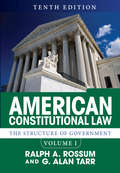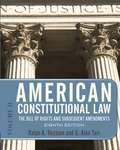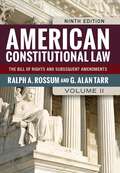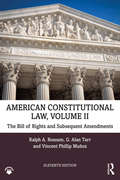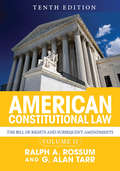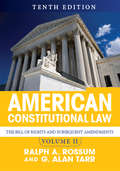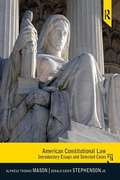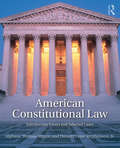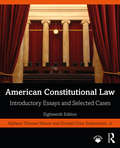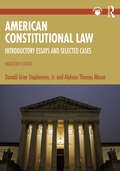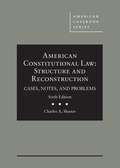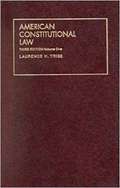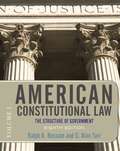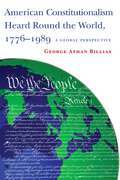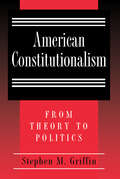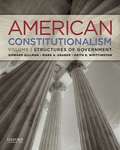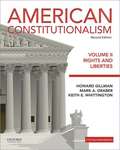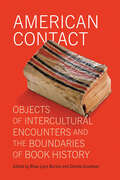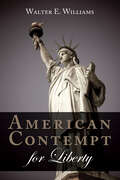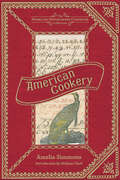- Table View
- List View
American Constitutional Law, Volume I: The Structure of Government
by Ralph A. RossumAmerican Constitutional Law, Volume I provides a comprehensive account of the nation's defining document, examining how its provisions were originally understood by those who drafted and ratified it, and how they have since been interpreted by the Supreme Court, Congress, the President, lower federal courts, and state judiciaries. Clear and accessible chapter introductions and a careful balance between classic and recent cases provide students with a sense of how the law has been understood and construed over the years.The Tenth Edition has been fully revised to include seven new cases, including key decisions National Labor Relations Board v. Noel Canning, Zivotofsky v. Kerry, Adoptive Couple v. Baby Girl, Horne v. Department of Agriculture and Comptroller of the Treasure of Maryland v. Wynne.A revamped and expanded companion website offers access to even more additional cases, an archive of primary documents, and links to online resources, making this text essential for any constitutional law course.
American Constitutional Law, Volume II
by Ralph A. Rossum G. Alan TarrEnhance your understanding of the nation ‚'s defining document with AMERICAN CONSTITUTIONAL LAW: THE BILL OF RIGHTS AND SUBSEQUENT AMENDMENTS, VOLUME II! With a focus on individuals ‚' rights and responsibilities, this political science text provides you with the information you need to understand the principles, prospects, and problems of America. Chapter and case introductions frame the development of the law and help you understand both the material and its context. Precedent-setting cases in areas such as privacy, criminal procedure, and abortion rights are included in the text and you can use the companion website to read additional cases of historical significance and current cases as they are decided.
American Constitutional Law, Volume II
by Ralph A. Rossum G. Alan TarrThe study of the Constitution and constitutional law is of fundamental importance to understanding the principles, prospects, and problems of America. American Constitutional Law, Volume II, provides a comprehensive account of the nation's defining document, comparing how its provisions were originally understood by those who drafted and ratified it with contemporary constructions. The authors examine the constitutional thought of the founders, as well as interpretations of the Constitution by the Supreme Court, Congress, the President, lower federal courts, and state judiciaries to provide students with a sense of how the law has been interpreted over the years. Now fully updated, the ninth edition of this classic volume features eleven new cases including Caperton v. A. T. Massey Coal Company, Citizens United v. Federal Election Commission, Perry v. Brown, Snyder v. Phelps, and Holder v. Humanitarian Law Project. Visit www.westviewconlaw.com for additional resources, including recently decided cases, material from prior editions, and a glossary.
American Constitutional Law, Volume II
by Ralph A. Rossum G. Alan TarrThe study of the Constitution and constitutional law is of fundamental importance to understanding the principles, prospects, and problems of America. American Constitutional Law, Volume II provides a comprehensive account of the nation’s defining document, comparing how its provisions were originally understood by those who drafted and ratified it with contemporary constructions. The authors examine the constitutional thought of the founders, as well as interpretations of the Constitution by the Supreme Court, Congress, the President, lower federal courts, and state judiciaries to provide students with a sense of how the law has been interpreted over the years. Now fully updated, the ninth edition of this classic volume features several new cases including Caperton v. A. T. Massey Coal Company, Citizens United v. Federal Election Commission, Perry v. Brown, Snyder v. Phelps, and Holder v. Humanitarian Law Project. Visit westviewconlaw. com for instructor resources, including recently decided cases, material from prior editions, and a glossary.
American Constitutional Law, Volume II
by Ralph A. Rossum G. Alan TarrAmerican Constitutional Law provides a comprehensive account of the nation’s defining document. Based on the premise that the study of the Constitution and constitutional law is of fundamental importance to understanding the principles, prospects, and problems of America, this text puts current events in terms of what those who initially drafted and ratified the Constitution sought to accomplish. The authors examine the constitutional thought of the founders, as well as interpretations of the Constitution by the Supreme Court, Congress, the President, lower federal courts, and state judiciaries. Now fully updated, the eighth edition of this classic volume focuses on individuals’ rights and responsibilities and incorporates nine new cases, including District of Columbia v. Heller, In re Marriage Cases, Kennedy v. Louisiana, and Parents Involved in Community Schools v. Seattle School District No. 1. Also available in its eighth edition from authors Ralph A. Rossum and G. Alan Tarr: American Constitutional Law, Volume I: The Structure of Government (Westview Press, ISBN 978-0-8133-4477-5).
American Constitutional Law, Volume II: The Bill of Rights and Subsequent Amendments
by Ralph A. Rossum Alan Tarr Vincent Phillip MunozAmerican Constitutional Law 11e, Volume II provides a comprehensive account of the nation's defining document, examining how its provisions were originally understood by those who drafted and ratified it, and how they have since been interpreted by the Supreme Court, Congress, the President, lower federal courts, and state judiciaries. Clear and accessible chapter introductions and a careful balance between classic and recent cases provide students with a sense of how the law has been understood and construed over the years. The 11th Edition now includes several landmark First Amendment cases, including Janus v. American Federation of State, County, and Municipal Employees (2018), Minnesota Voters Alliance v. Mansky (2018), National Institute of Family and Life Advocates v. Beccera (2018), Trinity Lutheran Church v. Comer (2017) and Masterpiece Cakeshop v. Colorado Civil Rights Commission (2018). It also includes Carpenter v. United States (2018). A revamped and expanded companion website offers access to even more additional cases, an archive of primary documents, and links to online resources, making this text essential for any constitutional law course.
American Constitutional Law, Volume II: The Bill of Rights and Subsequent Amendments
by Ralph A. Rossum G. Alan TarrAmerican Constitutional Law, Volume II provides a comprehensive account of the nation's defining document, examining how its provisions were originally understood by those who drafted and ratified it, and how they have since been interpreted by the Supreme Court, Congress, the President, lower federal courts, and state judiciaries. Clear and accessible chapter introductions and a careful balance between classic and recent cases provide students with a sense of how the law has been understood and construed over the years.The Tenth Edition has been fully revised to include twelve new cases, including key decisions Obergefell v. Hodges, Burwell v. Hobby Lobby Stores, Shelby County v. Holder, Horne v. Department of Agriculture, and Riley v. California. A revamped and expanded companion website offers access to even more additional cases, an archive of primary documents, and links to online resources, making this text essential for any constitutional law course.
American Constitutional Law, Volume II: The Bill of Rights and Subsequent Amendments
by Ralph A. RossumAmerican Constitutional Law, Volume II provides a comprehensive account of the nation's defining document, examining how its provisions were originally understood by those who drafted and ratified it, and how they have since been interpreted by the Supreme Court, Congress, the President, lower federal courts, and state judiciaries. Clear and accessible chapter introductions and a careful balance between classic and recent cases provide students with a sense of how the law has been understood and construed over the years. The Tenth Edition has been fully revised to include twelve new cases, including key decisions Obergefell v. Hodges, Burwell v. Hobby Lobby Stores, Shelby County v. Holder, Horne v. Department of Agriculture, and Riley v. California. A revamped and expanded companion website offers access to even more additional cases, an archive of primary documents, and links to online resources, making this text essential for any constitutional law course.
American Constitutional Law: Introductory Essays and Selected Cases
by Grier Stephenson Alpheus Thomas MasonThis classic collection of carefully selected and edited Supreme Court case excerpts and comprehensive background essays explores constitutional law and the role of the Supreme Court in its development and interpretation. Well-grounded in both theory and politics, it endeavors to heighten students' understanding of and interest in these critical areas of our governmental system.
American Constitutional Law: Introductory Essays and Selected Cases
by Donald Grier Stephenson Jr. Alpheus Thomas MasonThis classic collection of carefully selected and edited Supreme Court case excerpts and comprehensive background essays explores constitutional law and the role of the Supreme Court in its development and interpretation. Well-grounded in both theory and politics, it endeavors to heighten students' understanding of and interest in these critical areas of our governmental system. New to the 17th Edition 9 new cases (including 2 cases from the 2015–2016 term decided by 8 justices) and discussion of 30 additional new cases. New case highlights include Sebelius on Obamacare, Obergefell on same sex marriage, and 2 new cases on government surveillance. Covers the death of Justice Antonin Scalia and ensuing controversies. Updates every chapter-opening essay and end-of-chapter Selected Readings. Provides an author-written online Instructor’s Manual with Test Bank, historical Supreme Court documents, noteworthy decisions and dissents, and cases from previous editions.
American Constitutional Law: Introductory Essays and Selected Cases
by Alpheus Thomas Mason Donald Grier Stephenson, Jr.This book is a collection of comprehensive background essays coupled with carefully edited Supreme Court case excerpts designed to explore constitutional law and the role of the Supreme Court in its development and interpretation. Well-grounded in both theory and politics, the book endeavors to heighten students’ understanding of this critical part of the American political system. New to the 18th Edition An account of the Trump impeachments and a full discussion of the recent Supreme Court transitions including recent Supreme Court transitions including the fraught Kavanaugh hearings, the death of Ruth Bader Ginsberg, and the nomination process surrounding Amy Coney Barrett. Fourteen new cases carefully edited and excerpted, including Chifalo v. Washington (2020) on the Electoral College, Masterpiece Cakeshop (2018) on gay rights, and three Trump cases as well. Thirty-one new cases discussed in chapter essays in addition.
American Constitutional Law: Introductory Essays and Selected Cases
by Alpheus Thomas Mason Donald Grier Stephenson Jr.This book is a collection of comprehensive background essays coupled with carefully edited Supreme Court case excerpts designed to explore constitutional law and the role of the Supreme Court in its development and interpretation. Well-grounded in both theory and politics, the book endeavors to heighten students’ understanding of this critical part of the American political system. NEW TO THE 19th EDITION• An account of the recent Supreme Court transitions, including the Biden Court commission, the appointment of Ketanji Brown Jackson, and the heightened political and ethical difficulties facing the Court. • Five new cases carefully edited and excerpted, including Minor v. Happersett (1875) on gender and voting rights, Trump v. Anderson (2024) on access to the ballot, Carson v. Makin (2022) on religious freedom, New York Rifle & Pistol Assn. v. Bruen (2023) on Second Amendment rights, Dobbs v. Jackson Women’s Health Organization (2023) on abortion rights, and Students for Fair Admissions, Inc. v. President and Fellows of Harvard College, together with Students for Fair Admissions, Inc. v. University of North Carolina on affirmative action. • Twenty-one new cases discussed in chapter essays. • Tips on reading a Supreme Court decision remains as a box in Chapter One.
American Constitutional Law: Structure And Reconstruction, Cases, Notes, And Problems
by Charles ShanorThis law school casebook is concise, rigorous, and yet accessible to students. It contains approximately 100 primary cases, including a greater proportion of recent Supreme Court decisions than other casebooks. The notes provide context, and realistic problems facilitate application of constitutional law principles and cases. Covering structural constitutional law (judicial power, distribution of powers, Congress’ powers, federalism, and judicial protection of interstate commerce) and the reach of the Fourteenth Amendment (citizenship, privileges and immunities, due process, equal protection, and state action), this casebook incorporates entertaining elements and references contemporary controversies.
American Constitutional Law: Volume 1 (3rd Edition)
by Laurence H. TribeThis textbook focuses on the Constitution's provisions for government structure and on how constitutional structure helps guarantee protection of substantive rights and liberties. It promises to be an indispensable resource for teachers, students, practicing lawyers and judges. This preeminent treatise provides a wealth of original, insightful, and influential analysis of constitutional law doctrine and policy.Professor Tribe's central concern is the Constitution itself, not the Supreme Court as an institution. While addressing relevant issues of institutional capacities and roles, he does not stop at discussing the Court as the right or wrong forum to review a particular issue and render judgment; the more crucial question is whether the judgment itself was right or wrong as an element in the living development of constitutional justic
American Constitutional Law: Volume 1, The Structure of Government
by Ralph A. Rossum G. Alan TarrAmerican Constitutional Law provides a comprehensive account of the nation's defining document. Based on the premise that the study of the Constitution and constitutional law is of fundamental importance to understanding the principles, prospects, and problems of America, this text puts current events in terms of what those who initially drafted and ratified the Constitution sought to accomplish. The authors examine the constitutional thought of the founders, as well as interpretations of the Constitution by the Supreme Court, Congress, the President, lower federal courts, and state judiciaries. Now fully updated, the eighth edition of this classic volume focuses on federal rights and powers and incorporates six new cases, including Boumediene v. Bush, Medellin v. Texas, Hein v. Freedom from Religion Foundation, and Plains Commerce Bank v. Long Family Land and Cattle Company.Also available in its eighth edition from authors Ralph A. Rossum and G. Alan Tarr: American Constitutional Law, Volume II: The Bill of Rights and Subsequent Amendments (Westview Press, ISBN 978-0-8133-4478-2).
American Constitutional Law: Volume 2, The Bill of Rights and Subsequent Amendments
by Ralph A. Rossum G. Alan TarrAmerican Constitutional Law provides a comprehensive account of the nation's defining document. Based on the premise that the study of the Constitution and constitutional law is of fundamental importance to understanding the principles, prospects, and problems of America, this text puts current events in terms of what those who initially drafted and ratified the Constitution sought to accomplish. The authors examine the constitutional thought of the founders, as well as interpretations of the Constitution by the Supreme Court, Congress, the President, lower federal courts, and state judiciaries. Now fully updated, the eighth edition of this classic volume focuses on individuals' rights and responsibilities and incorporates nine new cases, including District of Columbia v. Heller, In re Marriage Cases, Kennedy v. Louisiana, and Parents Involved in Community Schools v. Seattle School District No. 1.Also available in its eighth edition from authors Ralph A. Rossum and G. Alan Tarr: American Constitutional Law, Volume I: The Structure of Government (Westview Press, ISBN 978-0-8133-4477-5).
American Constitutionalism Heard Round the World, 1776-1989: A Global Perspective
by George Athan BilliasWinner of the 2010 Book Award from the New England Historical AssociationAmerican constitutionalism represents this country’s greatest gift to human freedom, yet its story remains largely untold. For over two hundred years, its ideals, ideas, and institutions influenced different peoples in different lands at different times. American constitutionalism and the revolutionary republican documents on which it is based affected countless countries by helping them develop their own constitutional democracies. Western constitutionalism—of which America was a part along with Britain and France—reached a major turning point in global history in 1989, when the forces of democracy exceeded the forces of autocracy for the first time.Historian George Athan Billias traces the spread of American constitutionalism—from Europe, Latin America, and the Caribbean region, to Asia and Africa—beginning chronologically with the American Revolution and the fateful "shot heard round the world" and ending with the conclusion of the Cold War in 1989. The American model contributed significantly by spearheading the drive to greater democracy throughout the Western world, and Billias’s landmark study tells a story that will change the way readers view the important role American constitutionalism played during this era.
American Constitutionalism: From Theory to Politics
by Stephen M. GriffinDespite the outpouring of works on constitutional theory in the past several decades, no general introduction to the field has been available. Stephen Griffin provides here an original contribution to American constitutional theory in the form of a short, lucid introduction to the subject for scholars and an informed lay audience. He surveys in an unpolemical way the theoretical issues raised by judicial practice in the United States over the past three centuries, particularly since the Warren Court, and locates both theory and practices that have inspired dispute among jurists and scholars in historical context. At the same time he advances an argument about the distinctive nature of our American constitutionalism, regarding it as an instance of the interpenetration of law and politics. American Constitutionalism is unique in considering the perspectives of both law and political science in relation to constitutional theory. Constitutional theories produced by legal scholars do not usually discuss state-centered theories of American politics, the importance of institutions, behaviorist research on judicial decision making, or questions of constitutional reform, but this book takes into account the political science literature on these and other topics. The work also devotes substantial attention to judicial review and its relationship to American democracy and theories of constitutional interpretation.
American Constitutionalism: Volume I, Structures of Government
by Mark Graber Howard Gillman Keith WhittingtonIn this groundbreaking text, three highly acclaimed scholars provide historical context that puts the politics back into constitutional studies. Constitutionalism in the United States is not determined solely by decisions made by the Supreme Court. Moving beyond traditional casebooks, renowned scholars Howard Gillman, Mark A. Graber, and Keith E. Whittington take a refreshingly innovative approach in American Constitutionalism. Organized according to the standard two-semester sequence--in which Volume I covers institutions and Volume II covers Rights and Liberties-- this text is unique in that it presents the material in a historical organization within each volume, as opposed to the typical issues-based organization.
American Constitutionalism: Volume II: Rights And Liberties
by Keith E. Whittington Howard Gillman Mark A. GraberIn American Constitutionalism, Second Edition, renowned authors Howard Gillman, Mark A. Graber, and Keith E. Whittington offer an innovative approach to the two-semester Constitutional Law sequence (Volume 1 covers Institutions and Volume II covers Rights and Liberties) that presents the material in a historical organization within each volume, as opposed to the typical issues-based organization. Looking at Supreme Court decisions historically provides an opportunity for instructors to teach--and students to reflect on--the political factions and climate of the day. The second edition has been streamlined and also features updated cases, analysis, illustrations, and figures.
American Contact: Objects of Intercultural Encounters and the Boundaries of Book History (Material Texts)
by Rhae Lynn Barnes and Glenda GoodmanHow studying material texts can help us better understand the diversity of the Americas, past and presentA Hawai’ian quilt stitched with anti-imperial messages; a Jesuit report that captures the last words of a Wendat leader; an invitation to a ball, repurposed by enslaved people in colonial Antigua; a book of poetry printed in a Peruvian penitentiary. Countless material texts—legible artifacts—resulted from the diverse intercultural encounters that characterize the history of the Americas.American Contact explores the dynamics of intercultural encounters through the medium of material texts. The forty-eight short chapters present biographies about objects that range in size from four miles long to seven by ten centimeters; date from millennia in the past to the 2000s; and originate from South America, North America, the Caribbean, and other parts of the Atlantic and Pacific worlds. Each essay demonstrates how particular ways of reading can render the complex meanings of the objects legible—or explains why and how the meanings remain illegible.In its diversity and breadth, this volume shows how the field of book history can be more inclusive and expansive. Taken together, the essays shed new light on the material practices of communicating power and resistance, subjection and survivance, in contact zones of America.Contributors: Carlos Aguirre, Ahmed Idrissi Alami, Chadwick Allen, Rhae Lynn Barnes, Molly H. Bassett, Brian Bockelman, George Aaron Broadwell, Rachel Linnea Brown, Nancy Caronia, Raúl Coronado, Marlena Petra Cravens, Agnieszka Czeblakow, Lori Boornazian Diel, Elizabeth A. Dolan, Alejandra Dubcovsky, Cecily Duffie, Devin Fitzgerald, Glenda Goodman, Rachel B. Gross, David D. Hall, Sonia Hazard, Rachel B. Herrmann, Alex Hidalgo, Abimbola Cole Kai-Lewis, Alexandra Kaloyanides, Rachael Scarborough King, Danielle Knox, Bishop Lawton, Jessica C. Linker, Don James McLaughlin, John Henry Merritt, Gabriell Montgomery, Emily L. Moore, Isadora Moura Mota, Barbara E. Mundy, Santiago Muñoz Arbeláez, Marissa Nicosia, Diane Oliva, Megan E. O’Neil, Sergio Ospina Romero, John H. Pollack, Shari Rabin, Daniel Radus, Nathan Rees, Anne Ricculli, Maria Ryan, Maria Carolina Sintura, Cristina Soriano, Chelsea Stieber, Amy Kuʻuleialoha Stillman, Chris Suh, Mathew R. Swiatlowski, Marie Balsley Taylor, Martin A. Tsang, Germaine Warkentin, Adrian Chastain Weimer, Bethany Wiggin, Xine Yao, Corinna Zeltsman.
American Contagions: Epidemics and the Law from Smallpox to COVID-19
by John Fabian WittA concise history of how American law has shaped—and been shaped by—the experience of contagion“Contrarians and the civic-minded alike will find Witt’s legal survey a fascinating resource”—Kirkus, starred review “Professor Witt’s book is an original and thoughtful contribution to the interdisciplinary study of disease and American law. Although he covers the broad sweep of the American experience of epidemics from yellow fever to COVID-19, he is especially timely in his exploration of the legal background to the current disaster of the American response to the coronavirus. A thought-provoking, readable, and important work.”—Frank Snowden, author of Epidemics and Society From yellow fever to smallpox to polio to AIDS to COVID-19, epidemics have prompted Americans to make choices and answer questions about their basic values and their laws. In five concise chapters, historian John Fabian Witt traces the legal history of epidemics, showing how infectious disease has both shaped, and been shaped by, the law. Arguing that throughout American history legal approaches to public health have been liberal for some communities and authoritarian for others, Witt shows us how history’s answers to the major questions brought up by previous epidemics help shape our answers today: What is the relationship between individual liberty and the common good? What is the role of the federal government, and what is the role of the states? Will long-standing traditions of government and law give way to the social imperatives of an epidemic? Will we let the inequities of our mixed tradition continue?
American Contempt for Liberty
by Walter E. WilliamsThroughout history, personal liberty, free markets, and peaceable, voluntary exchanges have been roundly denounced by tyrants and often greeted with suspicion by the general public. Unfortunately, Americans have increasingly accepted the tyrannical ideas of reduced private property rights and reduced rights to profits, and have become enamored with restrictions on personal liberty and control by government. In this latest collection of essays selected from his syndicated newspaper columns, Walter E. Williams takes on a range of controversial issues surrounding race, education, the environment, the Constitution, health care, foreign policy, and more. Skewering the self-righteous and self-important forces throughout society, he makes the case for what he calls the "the moral superiority of personal liberty and its main ingredient—limited government." With his usual straightforward insights and honesty, Williams reveals the loss of liberty in nearly every important aspect of our lives, the massive decline in our values, and the moral tragedy that has befallen Americans today: our belief that it is acceptable for the government to forcibly use one American to serve the purposes of another.
American Cookery (American Antiquarian Cookbook Collection)
by Amelia SimmonsThis eighteenth century kitchen reference is the first cookbook published in the U.S. with recipes using local ingredients for American cooks. Named by the Library of Congress as one of the eighty-eight “Books That Shaped America,” American Cookery was the first cookbook by an American author published in the United States. Until its publication, cookbooks used by American colonists were British. As author Amelia Simmons states, the recipes here were “adapted to this country,” reflecting the fact that American cooks had learned to prepare meals using ingredients found in North America. This cookbook reveals the rich variety of food colonial Americans used, their tastes, cooking and eating habits, and even their rich, down-to-earth language.Bringing together English cooking methods with truly American products, American Cookery contains the first known printed recipes substituting American maize for English oats; the recipe for Johnny Cake is the first printed version using cornmeal; and there is also the first known recipe for turkey. Another innovation was Simmons’s use of pearlash—a staple in colonial households as a leavening agent in dough, which eventually led to the development of modern baking powders. A culinary classic, American Cookery is a landmark in the history of American cooking. “Thus, twenty years after the political upheaval of the American Revolution of 1776, a second revolution—a culinary revolution—occurred with the publication of a cookbook by an American for Americans.” —Jan Longone, curator of American Culinary History, University of MichiganThis facsimile edition of Amelia Simmons's American Cookery was reproduced by permission from the volume in the collection of the American Antiquarian Society, Worcester, Massachusetts, founded in 1812.
American Cookery: The First American Cookbook (American Antiquarian Cookbook Collection)
by Amelia SimmonsThis eighteenth century kitchen reference is the first cookbook published in the U.S. with recipes using local ingredients for American cooks. Named by the Library of Congress as one of the eighty-eight “Books That Shaped America,” American Cookery was the first cookbook by an American author published in the United States. Until its publication, cookbooks used by American colonists were British. As author Amelia Simmons states, the recipes here were “adapted to this country,” reflecting the fact that American cooks had learned to prepare meals using ingredients found in North America. This cookbook reveals the rich variety of food colonial Americans used, their tastes, cooking and eating habits, and even their rich, down-to-earth language.Bringing together English cooking methods with truly American products, American Cookery contains the first known printed recipes substituting American maize for English oats; the recipe for Johnny Cake is the first printed version using cornmeal; and there is also the first known recipe for turkey. Another innovation was Simmons’s use of pearlash—a staple in colonial households as a leavening agent in dough, which eventually led to the development of modern baking powders. A culinary classic, American Cookery is a landmark in the history of American cooking. “Thus, twenty years after the political upheaval of the American Revolution of 1776, a second revolution—a culinary revolution—occurred with the publication of a cookbook by an American for Americans.” —Jan Longone, curator of American Culinary History, University of MichiganThis facsimile edition of Amelia Simmons's American Cookery was reproduced by permission from the volume in the collection of the American Antiquarian Society, Worcester, Massachusetts, founded in 1812.
